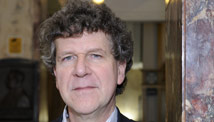British politicians rightly close the door to Murdoch

- Steven Barnett says phone hacking scandal is a watershed in British public life
- He says UK governments have traded scoops with Murdoch papers for political support
- Scandal has put an end to that, Barnett says
Editor's note: Steven Barnett is professor of communications at the University of Westminster. He was special adviser to the House of Lords select committee for its inquiry into media ownership in 2007-2008.
(CNN) -- As the resignations pile up in Britain's phone hacking scandal, the whole saga has already been compared to a Shakespearean tragedy.
This is no longer about the illegal interception of the voice mails left on the phone of a murdered 13-year-old schoolgirl, the key event that so appalled the world and galvanized British politicians into belated action. This has now become a watershed in British public life, a moment of transformational change that has no modern parallel. Some are comparing it, perhaps with just a touch of hyperbole, to a revolution on a par with the Arab spring.
There are two interweaved elements to this revolution, both of which were in the spotlight during the parliamentary hearings held Tuesday. First, there is the collusive and poisonous relationship between British government ministers and Rupert Murdoch's News Corp. For the last 30 years, starting with Conservative Prime Minister Margaret Thatcher and followed up with interest by Labour Prime Minister Tony Blair, British governments have traded political favors and big political scoops with the Murdoch newspapers in return for their political support.
As a result, Murdoch built a phenomenally powerful media empire and wielded power so great that it could only be acknowledged surreptitiously -- in the UK, quite literally, through the back door of Downing Street.
Why, he was asked Tuesday by one MP, did he go in the back entrance to see David Cameron days after his election as prime minister rather than the front door, like heads of state? Because he was told to, replied Rupert. Oh, and in case there was any doubt -- he did exactly the same, he said, with Gordon Brown when he was prime minister. Several times.
That power has almost visibly started draining away as political leaders fall over each other in their unseemly rush to distance themselves from an increasingly toxic media empire. From now on, it's quite clear the back door will be firmly locked. And the front door -- if it's used at all -- will be opened sparingly, transparently and nervously. The man every prime minister wanted to court has suddenly become their worst nightmare.
The second strand is the personal power Rupert Murdoch himself wields over his newspaper editors. Four years ago, I accompanied another parliamentary committee (this time from the House of Lords) to New York to hear evidence from Murdoch and other proprietors for an inquiry on media ownership. Rupert was quite clear about his editorial influence: He was a "traditional proprietor" for his UK tabloids, the Sun and the News of the World, exercising editorial control over which political party to back in a general election or what line to take on major policy issues like Europe. He looked and acted like a man in charge.
I was also in the room when he gave evidence Tuesday, and the contrast was sharp. Not only had the confident authority dissipated but he quite purposefully distanced himself from his British tabloids. He "seldom" speaks to the News of the World editor, and perhaps once or twice a month to the Sun editor. His master's voice, it seems, no longer commands the authority over his British editors that it once did.
Was this being a touch economical with the truth, to ensure that he stays untainted by the News of the World scandal? It didn't feel like it. It felt like a man who really has retreated to the United States, who is less interested in what his British tabloids are saying than he was, and is therefore -- by extension -- less able to terrorize the politicians who have for so long lived in fear not only of losing his patronage but also of having their or their family's personal lives splashed all over his front pages.
It may also, of course, have something to do with the declining readership of his tabloid papers, which are suffering the same fate as most newspapers worldwide: The Sun down from 3.5 million copies sold in 2000 to around 2.8 million copies today, and the News of the World down from more than 4 million in 2000 to 2.6 million just before its closure. And now, of course, there is no more News of the World nor any "immediate plans" to launch a new Sunday redtop.
So while there was plenty of contrition on show -- "the most humble day of my life" he said with head bowed, early in proceedings -- perhaps more significant were the real signs of waning authority. And most important of all, in terms of the health of British public life, a global audience witnessed a small cross-party group of Britain's elected representatives doing what they should have been doing for the last 30 years: holding the press, and Murdoch in particular, accountable for their actions rather than scurrying away like a bunch of frightened rabbits in the glare of News Corp.'s headlights.
The opinions expressed in this commentary are solely those of Steven Barnett.












